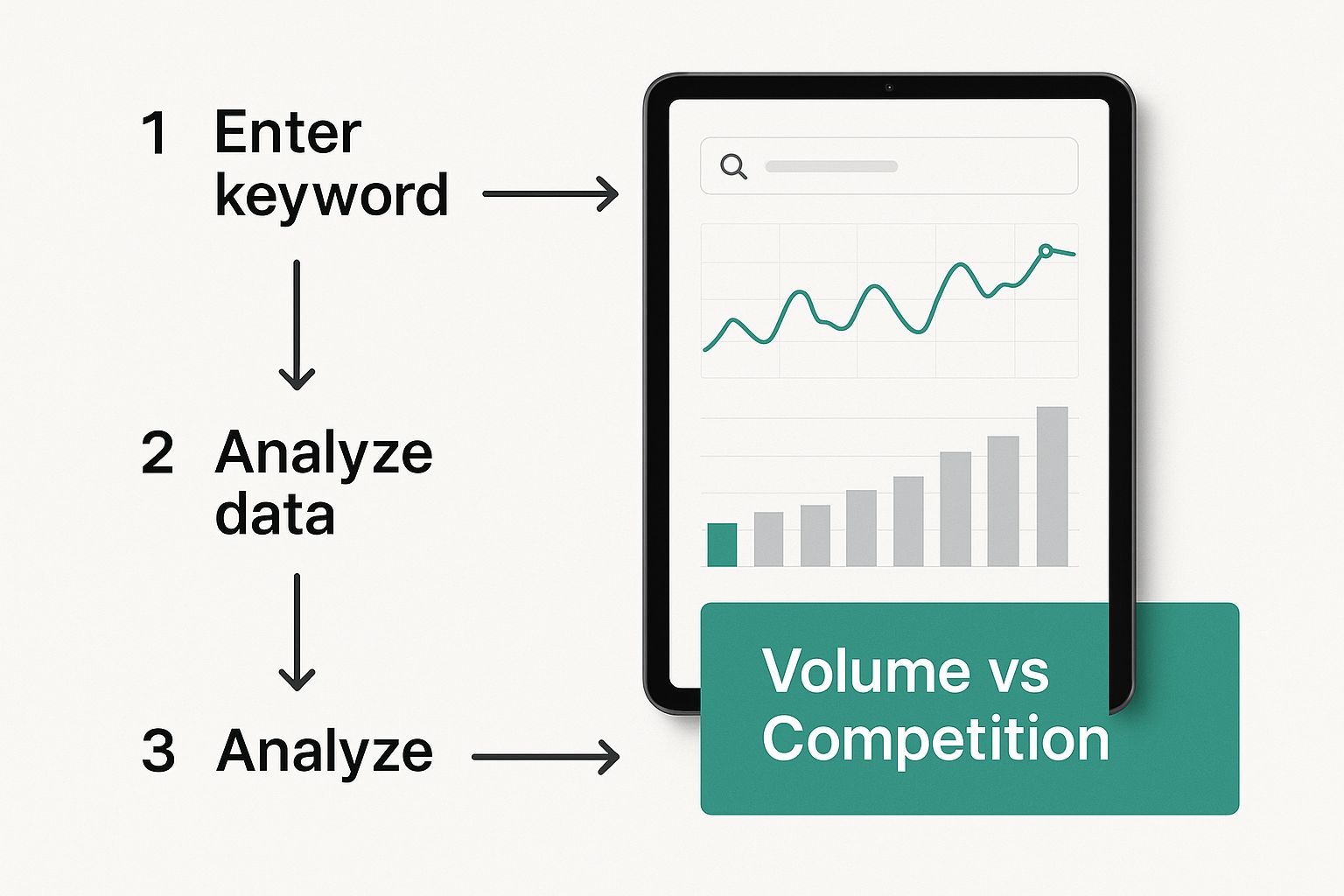
Let’s get real for a second. Trying to rank for a massive keyword like "best shoes"? It's like trying to win a footrace against a cheetah. You’re going up against giants, and it’s a battle you're probably not going to win. The real secret to winning at SEO isn’t about fighting harder; it’s about fighting smarter. This is where you learn how to find low competition keywords and build a solid foundation for traffic that actually converts.
Why Low Competition Keywords Are Your Smartest SEO Play

If you're a newer site or a small business, trying to outrank the big dogs for popular, super-broad keywords is a recipe for frustration. They’ve got the budgets, the history, and the armies of SEO pros. So, instead of playing a game you can't win, it's time to change the rules.
Focusing on low-competition keywords is simply the most intelligent way to grow. Think of it like this: while everyone else is stuck in a bumper-to-bumper traffic jam on the main highway, you’re cruising down a clear side street that leads directly to your ideal customer.
The Power of Being Specific
These hidden gem keywords are usually longer and way more specific. That’s a good thing! It means the person typing them into Google knows exactly what they're looking for.
Someone searching for "running shoes" is just window shopping. But what about the person searching for "lightweight running shoes for flat feet"? That person is a buyer. They have a problem and are actively looking for the solution.
This specificity unlocks a few massive advantages:
- Higher Conversion Rates: You're not just getting clicks; you're attracting people who are ready to buy, sign up, or take action.
- Faster Rankings: It’s so much easier to hit the first page of Google when you aren’t fighting a dozen household names for the top spot. We’re talking weeks, not years.
- Building Real Authority: Each low-competition term you rank for is like laying a brick. Over time, you build a solid wall of authority, and Google starts seeing you as an expert in your niche.
A Look at the Highs and Lows of Keyword Competition
To really see the difference, let’s break down the practical side of chasing those popular head terms versus strategically targeting the less crowded ones.
High Competition vs Low Competition Keywords at a Glance
| Attribute | High-Competition Keyword (e.g., 'leather jacket') | Low-Competition Keyword (e.g., 'leather bomber aviator jacket') |
|---|---|---|
| Search Volume | Very High (10k+ searches/month) | Lower (100-1k searches/month) |
| User Intent | Broad, often informational or browsing | Specific, often commercial or transactional |
| Competition | Fierce (dominated by big brands) | Minimal (opportunity for smaller sites) |
| Time to Rank | Long (6-12+ months) | Short (weeks to a few months) |
| Conversion Rate | Low | High |
| Authority Needed | High domain authority required | Can rank with lower authority |
See the pattern? The "big" keywords look tempting, but the "small" ones are where you actually make progress and build a profitable business.
A Practical Strategy for Building Traffic That Lasts
Let's be honest, keyword research isn't as simple as it used to be. For smaller sites, this makes finding a smart angle even more critical. Low-competition keywords are those search queries that have real people looking for them but aren't yet saturated with content from major players.
Sure, they might have lower individual search volumes. But when you rank for a whole bunch of them, you create a powerful, consistent stream of traffic. This whole approach works because you’re matching user intent perfectly, giving people the exact answers they need. This makes for happy visitors and, ultimately, more conversions. Plenty of successful bloggers have perfected this method, and you can learn more from their experience at productiveblogging.com.
The goal isn't to get the most traffic; it's to get the right traffic. A collection of "easy win" keywords can build a powerful stream of organic visitors that big brands often overlook, giving you the edge you need to grow.
Alright, let's ditch the robotic tone and get real about finding keywords. Before you even touch a fancy SEO tool, the most powerful starting point is right between your ears. We're going to build what's called a "seed list."
Think of it as a brainstorming dump—a raw, messy collection of topics, customer problems, and random questions. This isn't about finding perfect, low-competition keywords yet. It's about creating the fertile ground where those keywords will eventually grow.
Starting this way keeps your entire strategy anchored in how real people think and talk. You'll end up with keywords that actually connect with customers, not just what a data table says is good.
Get Inside Your Customer's Head
Seriously, put yourself in their shoes. What’s bugging them? What problems are they trying to solve that you can help with? Forget all the corporate-speak and industry jargon for a minute. What would they actually type into Google?
Your own customer data is the best place to start digging. Go through your:
- Support Emails & Chat Logs: Pay close attention to the exact phrasing people use. Recurring questions are basically long-tail keywords being handed to you on a silver platter.
- Sales Call Notes: What are the biggest pain points or hesitations that pop up in sales calls? These are the real-world obstacles you need to create content around.
- Customer Reviews: Don't just skim them. Look at the language in both the glowing 5-star reviews and the grumpy 1-star ones. What specific benefits do happy customers mention? What frustrations trip people up?
Let's say you sell eco-friendly cleaning supplies. You might find a support ticket that says, "is your all-purpose cleaner safe for marble countertops?" or "what can I use to clean tough grease stains without harsh chemicals?" That's keyword gold right there.
Eavesdrop on Online Communities
Your ideal customers are already online, gathered in digital watering holes, talking about their problems. Your job is to find these places and just listen. These niche communities are pure, unfiltered sources of customer language.
My Go-To Move: I always look for discussion threads titled with "How do I…?", "What's the best way to…?", or "Can anyone recommend…?". These are literally people asking for the solutions you can provide.
Here are the usual suspects for this kind of intel:
- Reddit: Find the subreddits where your people hang out. Think r/gardening, r/skincareaddiction, or whatever fits your niche.
- Quora: Search for broad topics and see what questions people are asking. The "Related Questions" sidebar can send you down some very productive rabbit holes.
- Niche Forums: Trust me, there’s a forum for everything—from vintage car restoration to vegan baking. A quick Google search for "[your topic] + forum" will usually unearth some gems.
Imagine you run a small bakery. Hanging out on a local community Reddit, you might stumble upon a post titled, "Best gluten-free cupcakes in town that don't taste like cardboard." That's more than a keyword—it’s a direct window into what a customer wants and what they're afraid of. This is the secret sauce to finding those low-competition keywords that truly hit home.
After you've done this brainstorming and snooping, you should have a pretty beefy—and probably messy—list of at least 50-100 ideas. Don't worry about perfecting it. This raw list is the fuel we'll use in the next step, where we finally bring in the tools to sharpen our focus.
Time to Dig for Keyword Gold with AI
Alright, you've got your initial list of ideas. Now for the fun part: using some slick tech to turn that raw brainstorm into a real treasure map. This is where we stop guessing and start finding actual opportunities. SEO platforms built with AI, like RankHub, are absolute game-changers here. They take your seed keywords and mushroom them into hundreds of long-tail phrases you'd likely never stumble upon yourself.
Let's say you're building a blog about sustainable gardening. Your starter list might have broad terms like "eco-friendly garden" or "organic vegetable patch." When you pop those into an AI tool, it’s like giving a hound a scent to follow. It immediately starts sniffing out more specific, tangible phrases that real people are plugging into Google.
From Vague Ideas to Actionable Keywords
The real magic of these tools isn't just generating a massive list of keywords—it's helping you filter through the noise. You're not just hunting for any keyword; you're on the lookout for the right one. And that means you need to get comfortable with a couple of key metrics that separate the duds from the diamonds.
You'll see these two pop up everywhere:
- Search Volume: A rough estimate of how many times a keyword gets searched each month. Bigger isn't always better here, as high volume almost always means high competition.
- Keyword Difficulty (KD): This is a score, usually from 0 to 100, that predicts how tough it will be to crack the first page of Google for that term. You're looking for a low KD. It's your golden ticket.
For example, "sustainable gardening" might have a huge search volume, but its KD score could be crushingly high. The AI, however, might spit out something like "DIY vertical herb garden for small balcony." This phrase will have a much smaller search volume, sure, but its KD score will probably be in the single digits. That's a perfect target.
A low difficulty score is your express pass to the front page. It’s a signal that the current top-ranking pages are beatable, even if your site doesn't have a ton of authority yet.
This is exactly what the AI tools help you visualize. They map out where keywords fall on the spectrum of volume vs. competition, so you can zero in on that sweet spot.

As you can see, the real value is often hiding in that low-competition, moderate-volume quadrant. That's where AI tools truly shine—they find these opportunities in seconds.
Making Sense of the Data to Find Easy Wins
Honestly, a huge part of finding these low-competition keywords is just letting the AI do the heavy lifting of assessing difficulty. These tools chew through mountains of data to assign those KD scores, flagging long-tail phrases that old-school methods would have missed entirely.
Think about it. A generic term like 'leather jacket' is a battlefield. But a more specific phrase like "leather bomber aviator jacket," which gets around 320 searches a month in the U.S., is a much more winnable fight. It’s this kind of targeted thinking that gets you ranking faster. If you want to dive deeper into this, there's a great post on using AI for keyword discovery over at seobotai.com.
AI platforms basically automate the most tedious part of the research. You get to skip straight to analyzing high-potential keywords that are actually relevant to your site. That's the kind of efficiency that gives you a real strategic edge.
Manually Vet the SERPs for True Competition
Okay, so your AI tool spat out a keyword with a nice, low difficulty score. Great! But hold on—we're not done yet. Think of that score as a strong hint, not a golden ticket.
This next part is what separates the folks who get real results from those who just spin their wheels. It's the step where so many people trip up: learning to actually read a Google search results page (SERP) to see what the competition really looks like.
This manual check is your dose of reality. It tells you if you've found a genuine opportunity or a cleverly disguised waste of time. When you look at the SERP with your own eyes, you can spot weaknesses and openings that no data point can ever show you.
What to Look For on Page One
When you pop your target keyword into Google, you're not just scanning the top 10 links. You're putting on your detective hat. You need to size up who you’d actually be competing against.
Here's the mental checklist I run through every single time I do this:
- Big Authority vs. Small Players: Are the top spots clogged with huge names like Forbes, Wikipedia, or the biggest brands in your industry? Or are you seeing smaller niche blogs, forums, or even articles that look a bit dated? Seeing those smaller sites is a fantastic sign.
- Exact-Match Titles: Look at the page titles. Do they match your keyword almost word-for-word? If they do, the search intent is crystal clear. But if Google is serving up pages with slightly different titles, it might be scrambling to find a perfect fit—and that's an opening for you.
- User-Generated Content (UGC): This is the big one. Are you seeing forum threads from places like Reddit or Quora ranking high up? This is a massive green light. It usually means there's a serious lack of high-quality, definitive content on the subject.
Spotting a Reddit thread or a niche forum in the top 5 results for a keyword is like finding a giant "vacancy" sign on the front page of Google. It means you can likely outrank it with a well-structured, authoritative article.
Analyzing Competitor Strength
Beyond a quick glance, it's time to dig a little deeper into the pages that are actually ranking. The goal here is simple: can you honestly create something better?
One of the quickest ways to gauge this is by checking the Domain Authority (DA) of the top-ranking sites. You can use free browser extensions like the MozBar or Ahrefs' SEO Toolbar to see this data overlaid right on the search results. If you see a few sites with a DA under 40 on the first page, you've likely found a very winnable keyword.
Next, actually click into the top 3-5 results. Is the content thin? Badly written? Visibly outdated? Is the page a nightmare to use, with pop-ups everywhere? These are all vulnerabilities. Every single one is an opportunity for you to do better.
This hands-on approach isn't just my opinion; it's a core SEO strategy. Targeting these less-defended keywords lets you build momentum and authority much faster. Many experts suggest focusing on keywords with a difficulty score below 30 and then confirming with this manual SERP check to get the best results. It's how you build up your site's strength, so you can eventually take on the bigger, tougher keywords. To dive deeper into this strategy, you can discover more insights about boosting site rankings on numberanalytics.com.
Turning Your New Keywords Into a Real Content Plan

Finding a solid list of low-competition keywords feels like striking gold, but let's be real—it's only the first step. A list of keywords is just data. What you need is an actual plan to turn that data into traffic, leads, and sales. So, how do we get from a spreadsheet of terms to a content calendar that drives results?
The trick is to think strategically. Don't just start writing random articles for each keyword you found. We need to group them together in a way that makes sense. This is where the "topic cluster" model has been a game-changer for so many sites, including my own. It's a method for organizing content that shows search engines you're an authority on a subject, helping you rank for a whole bunch of terms over time.
This is a crucial part of learning how to find low competition keywords and actually put them to work. You're not just trying to win a few small rankings; you're building an interconnected web of content that makes your site the resource for a particular niche.
Build Authority and Rank Faster with Topic Clusters
A topic cluster sounds fancy, but the concept is surprisingly simple and powerful. You create one main, in-depth "pillar" page on a broad topic. Then, you create several supporting "cluster" articles that dive deep into specific, related subtopics.
Pillar Page: This is your big, cornerstone guide. It targets a broader (but still winnable) keyword. Think of something like "The Ultimate Guide to Container Gardening."
Cluster Content: These are your supporting articles. They are much more focused and target those specific long-tail keywords you found. Using our gardening example, cluster posts might be "best soil mix for potted tomatoes" or "how to properly water herbs on a balcony."
The magic happens with internal linking. Every cluster post links back up to your main pillar page. This sends a clear signal to Google that your pillar page is the central hub of authority on that topic. As your smaller cluster posts start to rank, they pass that authority up to the pillar page, helping it climb the rankings for more competitive terms.
Key Takeaway: A topic cluster is more than just a neat way to organize posts—it's a potent SEO strategy. It proves your expertise on a subject (topical authority), which Google loves. This structure helps you rank for lots of individual keywords while simultaneously boosting your credibility for the entire topic.
Match Your Keywords to the Right Content Format
Okay, you've got your keywords grouped into clusters. Now what? The next step is to figure out what kind of content to create for each keyword. This decision should always come back to one thing: search intent. What is the person who typed that phrase into Google really looking for?
Here’s a simple way I think about it:
"How-to" Keywords: If someone searches "how to repot a snake plant," they want a step-by-step guide. Give them clear instructions, maybe with photos for each step or even a short video.
"Best" or "Vs" Keywords: For terms like "best indoor plants for low light" or "snake plant vs zz plant," they're in comparison mode. A listicle reviewing the top options or a head-to-head comparison article with pros and cons is perfect here.
Question-Based Keywords: When you see a keyword like "why are my plant's leaves turning yellow," the user has a specific problem. A direct, Q&A-style blog post that answers the question clearly and concisely is the way to go.
When you align your content format with what the searcher actually wants, you create a genuinely helpful experience. Not only does this give you a better shot at ranking, but it also encourages people to stick around, which sends all the right signals back to Google.
Got Questions? Let's Clear Things Up
Even the most seasoned SEO pros hit snags during keyword research. It’s completely normal to second-guess yourself or wonder if you’re heading in the right direction. Let's walk through some of the questions I hear all the time from people trying to find those sweet-spot, low-competition keywords.
These are the real-world, nitty-gritty issues that can throw a wrench in your plans. Nailing these down will give you the confidence to move forward and really execute your strategy.
What if a Keyword Shows Zero Search Volume?
Seeing a big fat "0" in the search volume column makes most people immediately toss a keyword aside. Not so fast. While they might not look like much, these terms can be absolute gold, especially if your site is just getting off the ground.
First off, remember that keyword tools are notorious for underestimating search volume. I’ve seen plenty of "zero volume" keywords pull in 10-20 highly relevant visitors every single month. That traffic is often super-targeted because the searcher knows exactly what they're looking for.
Even better, these ultra-specific, long-tail keywords are fantastic for building topical authority. When you write a post answering something like "can I use orchid fertilizer on a peace lily," you're sending a massive signal to Google that you're a legitimate expert in plant care.
My Take: I almost always sprinkle a few zero-volume keywords into a new topic cluster I'm building. They're usually a breeze to rank for, and a handful of them can start bringing in a trickle of dedicated readers while I go after the more competitive terms.
My Entire Niche Seems Way Too Competitive
This is a big one. You dive into your niche—whether it’s finance, fitness, or marketing—and it feels like every single keyword is locked down by massive authority sites. It’s frustrating, but it doesn't mean you should pack it in. It just means you need to get creative and dig a little deeper.
The trick is to add specific "qualifiers" to your main topics. Start thinking in layers:
- Who is it for? Instead of just "personal finance tips," think "personal finance tips for freelance artists."
- What's the price? Don't go for "best laptops." Go for "best laptops under $500 for college students."
- Where is it? If you're a local business, "yoga classes" is way too broad. Try "beginner Vinyasa yoga classes in downtown Austin."
- What's the problem? Instead of the huge topic of "skincare," narrow it down to "skincare routine for rosacea-prone oily skin."
When you start layering on these angles, you’re no longer fighting on the main battlefield. You're carving out your own little hill where the competition is thin, giving you a real chance to own that space.
How Often Should I Do Keyword Research?
Keyword research isn't a task you do once and then forget about. It's more like a regular check-up for your website's health. For most sites, a deep-dive research session once a quarter is a pretty solid cadence.
Doing it quarterly lets you map out your content for the next three months using fresh data. It also gives you the flexibility to jump on new trends, seasonal topics, or any big shifts happening in your industry.
On top of that, I always keep a "running list" of ideas. Anytime I see an interesting question from a customer, a hot topic on a forum, or just a random thought, I jot it down. That way, when my quarterly planning session rolls around, I’m not starting from scratch—I’ve got a whole list of seed ideas ready to analyze.
Tired of staring at spreadsheets and doing all this analysis by hand? RankHub is built to take the grunt work out of finding these golden opportunities. Our AI platform scans your site, gets to know your business, and surfaces high-value, low-competition keywords in minutes. Stop guessing and start making smarter SEO moves today at https://www.rankhub.ai.
Article created using Outrank
More from Our Blog
7 Killer Content Strategy Example Ideas to Copy in 2025
Looking for a proven content strategy example? We break down 7 real-world strategies from HubSpot, Red Bull & more to inspire your own plan.
Read more →
Analyze Keyword Competition Like a Pro
Tired of guessing? Learn how to analyze keyword competition with our practical guide. We cover the tools, metrics, and workflows to find winnable keywords.
Read more →
Ecommerce Content Strategy for Ecommerce | Win More Sales
Master your content strategy for ecommerce to boost traffic, engage customers, and increase sales. Learn proven tactics to grow your online store.
Read more →